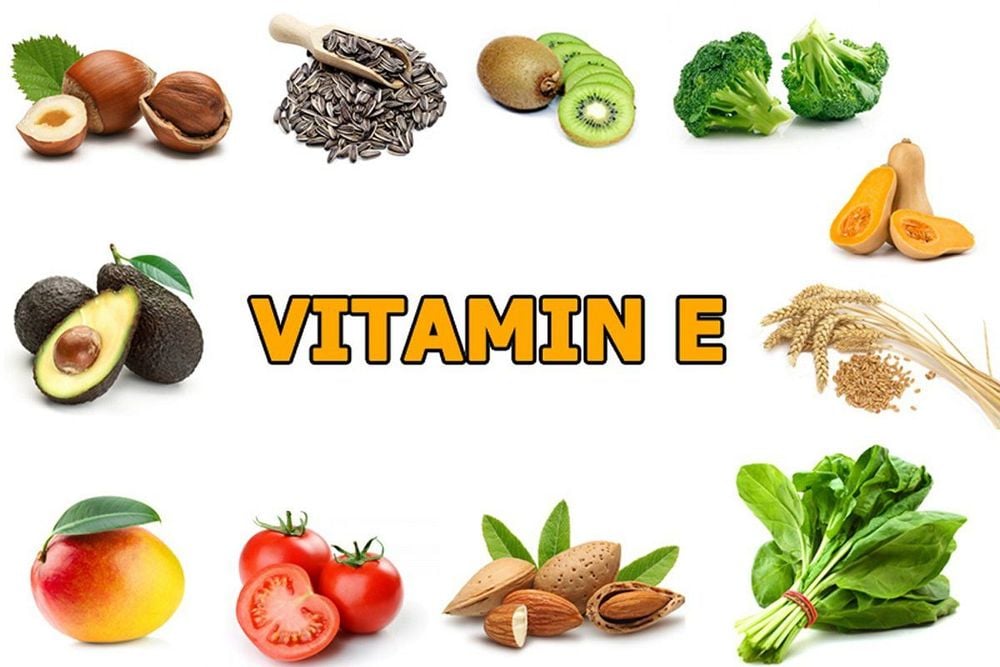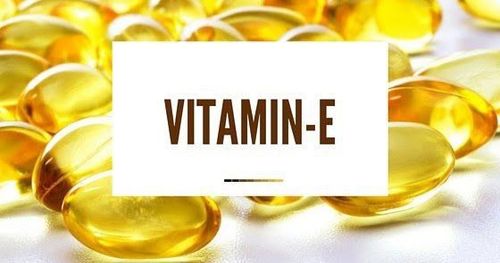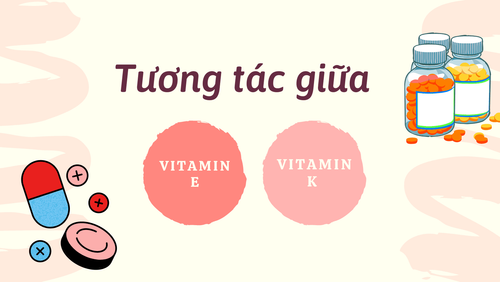This is an automatically translated article.
Vitamin E levels in the body are always stable and most people on a normal diet do not need vitamin E supplements. Vitamin E supplements are used for premature babies and people with problems. in getting enough vitamin E from the diet. However, excessive use of vitamin E will cause some adverse health effects.
1. Effects of Vitamin E
Vitamin E is a vitamin found in many foods including vegetable oils, grains, meat, poultry, eggs, fruits, vegetables and wheat germ oils, and is fat soluble. .The effect of vitamin E is mainly to supplement vitamin E deficiency. In addition, it is also effective in the treatment of diseases such as Alzheimer's, anemia, Beta - thalassemia, nerve damage related to chemotherapy , menstrual pain , kidney problems in children , healing granuloma , male infertility , intracranial bleeding , liver diseases , premenstrual syndrome , rheumatoid arthritis , uveitis .. .. Besides, the role of vitamin E is very important in protecting the cells of the body and vitamin E is known as an antioxidant. Currently, vitamin E is available under different brand names as follows: Aquasol E, alpha-tocopherol and tocopherol.
Not effective for diseases such as macular degeneration, angina, atherosclerosis, cataracts, eczema, heart failure, colorectal cancer, high blood pressure, mouth sores, osteoarthritis, cancer nasopharyngeal cancer, pancreatic cancer, respiratory infection, scarring...

Vitamin E là một loại vitamin được tìm thấy trong nhiều loại thực phẩm
2. Is it safe to take vitamin E?
Vitamin E is absolutely safe for most healthy people when taken by mouth or applied to the skin. Most people do not experience any side effects when taking the recommended daily dose, which is 22.4 IU.
Vitamin E may not be safe if taken orally in high doses. If you have heart disease or diabetes, do not take 400 IU/day or more. Some research shows that high doses can increase your chance of dying and may cause other serious side effects. The higher the dose, the greater the risk of serious side effects.
Some are concerned that vitamin E may increase the risk of having a serious stroke caused by a brain hemorrhage. Some research shows that taking vitamin E in doses of 300-800 IU per day can increase the risk of this type of stroke by 22%. In contrast, however, vitamin E may reduce the risk of a less severe stroke called ischemic stroke.
There is conflicting information about the effects of vitamin E on prostate cancer development. Some research suggests that taking large amounts of multivitamins with a separate vitamin E supplement may increase the risk of developing prostate cancer in men.
Too high a dose of vitamin E can cause nausea, diarrhea, stomach cramps, fatigue, loss of appetite, weakness, headache, blurred vision, rash, bruising, bleeding...
3. Special warnings
Pregnancy: When used in recommended daily doses, vitamin E is POSSIBLY SAFE for pregnant women. However, before using it, consult your doctor. Breast-feeding: Vitamin E is absolutely safe if taken by mouth in the recommended daily amounts while breastfeeding. Infants and young children: Vitamin E is absolutely safe when taken by mouth appropriately. The maximum amount of vitamin E considered safe for children is based on age. Less than 298 IU per day - safe for children 1 to 3 years old. Less than 447 IU per day - safe for children ages 4 to 8. Less than 894 IU per day - safe for children 9 to 13 years old. Less than 1192 IU per day - safe for children 14 to 18 years old. Vitamin E (alpha-tocopherol) may not be safe when given intravenously (by IV) to premature infants in high doses. Diabetes: Vitamin E may increase the risk of heart failure in people with diabetes. People with diabetes should avoid taking high doses of vitamin E. Heart attack: Vitamin E can increase the risk of death in people with a history of heart attack, so people with a history of heart attacks should not take high doses of vitamin E. Vitamin K deficiency: Using vitamin E may worsen blood clotting problems in people with low vitamin K levels. Bleeding disorders: Vitamin E may worsen bleeding disorders. If you have a bleeding disorder, avoid vitamin E supplements. Head and neck cancer: Do not take vitamin E supplements at doses of 400 IU/day or more. Vitamin E may increase the risk of cancer coming back. Stroke: Vitamin E may increase the risk of death in people with a history of stroke. People with a history of stroke should avoid taking high doses of vitamin E. Surgery: Vitamin E may increase the risk of bleeding during and after surgery. Stop using vitamin E at least 2 weeks before a scheduled surgery.

Vitamin E an toàn tuyệt đối với hầu hết những người khỏe mạnh
4. Drug interactions
Anti-cancer antibiotic: Vitamin E is an antioxidant. However, some research suggests that antioxidants may reduce the effectiveness of antibiotics used for cancer. But there's also no research to show whether an interaction occurs. Some antibiotics used for cancer include doxorubicin (Adriamycin), daunorubicin (DaunoXome), epirubicin (Ellence), mitomycin (Mutamycin), bleomycin (Blenoxane), ..... Anticoagulants: Vitamin E has can slow blood clotting. Taking vitamin E with medicines that slow blood clotting including aspirin, clopidogrel (Plavix), diclofenac (Voltaren, Cataflam...), ibuprofen (Advil, Motrin...), naproxen (Anaprox, Naproxen...) , dalteparin (Fragmin ), enoxaparin ( Lovenox ), heparin , warfarin ( Coumadin ), and others may increase your risk of bruising and bleeding. Cholesterol-lowering drugs (Statins): Taking vitamin E, beta-carotene, vitamin C, and selenium together might decrease the effectiveness of some medications used to lower cholesterol. Some medications used to lower cholesterol include atorvastatin (Lipitor), fluvastatin (Lescol), lovastatin (Mevacor), and pravastatin (Pravachol). Niacin: Taking vitamin E along with beta-carotene, vitamin C, and selenium might decrease some of the beneficial effects of niacin. Niacin can increase good cholesterol. Taking vitamin E along with these other vitamins can lower good cholesterol. Warfarin (Coumadin) - A drug that slows blood clotting. Taking vitamin E along with warfarin (Coumadin) might increase the chance of bruising and bleeding. Make sure to have regular blood tests.
5. Appropriate dosage
To enhance the possibility of combination therapy as well as minimize the side effects due to overdose. Scientists have established standard doses of vitamin E for a few specific conditions:
For vitamin E deficiency: The usual adult dose is RRR-alpha tocopherol (natural vitamin E) 60-75 IU every day. For anemia: Vitamin E 447-745 IU daily with erythropoietin 93-74U/kg/week. To improve male fertility: vitamin E 298-894 IU daily. For Alzheimer's: Up to 2000 IU per day. The combination therapy donepezil (Aricept) 5mg and vitamin E 1000 IU daily has been used to slow memory decline in people with Alzheimer's disease. For liver disease called nonalcoholic steatohepatitis: 800 IU per day in adults has been used; 400-1200 IU daily has been used in children. For pain from rheumatoid arthritis: Vitamin E 600 IU twice daily. To improve the effectiveness of nitrates used for heart disease: vitamin E 298 IU three times daily. To reduce protein in the urine of children with a kidney disease called focal segmental glomerulosclerosis: Vitamin E 200 IU. For G6PD enzyme deficiency: vitamin E 800 IU daily. For premenstrual syndrome (PMS): RRR-alpha-tocopherol (natural vitamin E) 400 IU daily. For painful menstrual periods: Vitamin E 200 IU twice or 500 IU daily starting 2 days before menstruation and continuing for the first 3 days of bleeding. For eye healing after keratectomy: 343 IU of vitamin E (alpha-tocopheryl nicotinate) and vitamin A (retinol palmitate) 25,000 units have been used 3 times daily for 30 days, followed by twice daily in 2 months. For radiation-induced fibrosis: Vitamin E 1000 IU daily in combination with pentoxifylline 800 mg. For beta-thalassemia: Vitamin E 750 IU daily. For swelling in the middle layer of the eye (uveitis): Vitamin E (unspecified form) 149 IU combined with vitamin C 500 mg twice daily. To prevent sunburn: RRR-alpha-tocopherol (natural vitamin E) 1000 IU combined with 2 grams of ascorbic acid.

Liều vitamin E quá cao có thể gây buồn nôn, tiêu chảy
Please dial HOTLINE for more information or register for an appointment HERE. Download MyVinmec app to make appointments faster and to manage your bookings easily.
References: drugs.com, rxlist.com












